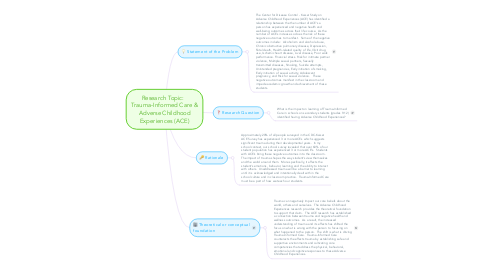Research Topic: Trauma-Informed Care & Adverse Childhood Experiences (ACE)
by Scott Armstrong

1. Statement of the Problem
1.1. The Center for Disease Control - Kaiser Study on Adverse Childhood Experiences (ACE) has identified a relationship between the the number of ACE’s a person has experienced and negative health and well-being outcomes across their life course. As the number of ACEs increase so does the risk of these negative outcomes to manifest. Some of the negative outcomes include: Alcoholism and alcohol abuse, Chronic obstructive pulmonary disease, Depression, Fetal death, Health-related quality of life, Illicit drug use, Ischemic heart disease, Liver disease, Poor work performance. Financial stress. Risk for intimate partner violence, Multiple sexual partners, Sexually transmitted diseases, Smoking, Suicide attempts, Unintended pregnancies, Early initiation of smoking, Early initiation of sexual activity, Adolescent pregnancy, and Risk for sexual violence. These negative outcomes manifest in the classroom and impede academic growth and achievement of these students.
2. Research Question
2.1. What is the impact on learning of Trauma-Informed Care in schools on secondary students (grades 9-12) identified having Adverse Childhood Experiences?
3. Rationale
3.1. Approximately 20% of all people surveyed in the CDC-Kaiser ACE Survey has experienced 3 or more ACEs which suggests significant trauma during their developmental years. In my school context, our school survey revealed that over 60% of our student population has experienced 3 or more ACE’s. Students with ACE’s bring these negative outcomes into the classroom. The impact of trauma shapes the way student’s view themselves and the world around them. More specifically, it affects the student’s emotions, behavior, learning and the ability to interact with others. Unaddressed trauma will be a barrier to learning until it is acknowledged and intentionally dealt with in the school culture and in classroom practice. Trauma-Informed Care must be a part of how we teach our students.
4. Theoretical or conceptual foundation
4.1. Trauma can negatively impact our core beliefs about the world, others and ourselves. The Adverse Childhood Experiences research provides the theoretical foundation to support that claim. The ACE research has established a connection between trauma and negative health and wellness outcomes. As a result, the increased understanding of trauma and its effects has shifted the focus on what is wrong with the person to focusing on what happened to the person. The shift is what is driving Trauma-Informed Care. Trauma-Informed Care counteracts the effects trauma by establishing safe and supportive environments and cultivating core competencies that address the physical, behavioral, emotional and cognitive responses to these Adverse Childhood Experiences.


